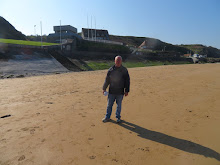Oswald's Tale by Norman Mailer. Mailer was a great writer and this book was every bit as good as his Pulitzer Prize winning book, The Executioner's Song. This book on Lee Harvey Oswald, a still-mysterious figure that, perhaps lone wolf style, changed US history forever with his assassination of President Kennedy. (Think Vietnam, the Great Society, RMN, Watergate). The book details Oswald's dreary and closely monitored (by the Russkies) time in the Soviet Union after he defected, and when he came back married to perhaps a KGB operative. In short order this secretive, querulous lazy-bones drifter committed the most improbable crime of century. It was an interesting book, Mailer came to no conclusion as to whether Oswald acted alone, he said--Maybe. Mailer did, however, convince me in seven pages at the end of this tome that Jack Ruby probably acted on behalf of the mob to rub out Oswald.
Silas Mariner by George Eliot (Mary Ann Evans). This short novel about a reclusive gold-hearted, gold-hoarding tailor is classic literature and tugs at your heart as all comes out right in the end. It's depressing to think that in the nineteenth century women authors had to write under male names to get their books published, reviewed seriously and read.
Death of a Salesman by Arthur Miller. This classic play introduced Willie Lomax to American lexicon, a prototypical loser, destroyed at the end, and full of closely guarded secrets, as are several of his family members also.
Jane Eyre by Charlotte Bronte. My reading of Victorian novels by female authors continues, they are all worthwhile and I wasn't exposed to them in my educational upbringing at an all-boys high school. I read Dickens and my sisters read Bronte. I loved Wuthering Heights by Emily Bronte (published under the pseudonym Ellis Bell) , which I read in 2015, and this was a good book too, especially the first half. The incredible, improbable plot-driven coincidences piled up too high by the end for me to think this book is superior to her sister's stunning novel but it did give us the notion of the crazy relative in the attic. Watch the 1943 movie starring Orson Wells, and read the book, and you'll be richly rewarded.
True Grit by Charles Portis. A little known western novel that is totally engrossing. Most people are familiar with the two cinematic adaptations, starring John Wayne or Jeff Bridges, both interesting in their own right, but this book will absorb you and is full of homilies and life truisms.
Agnes Grey by Anne Bronte. The least known of the Bronte sisters' novels, interesting and convoluted. From hard beginnings, this governess persevered and prospered because of the wholeness of her staid and sturdy character. Is there a common theme running through the Bronte novels, do you suppose? I just wish Emily had lived past age 30 and written at least a second novel.

No comments:
Post a Comment